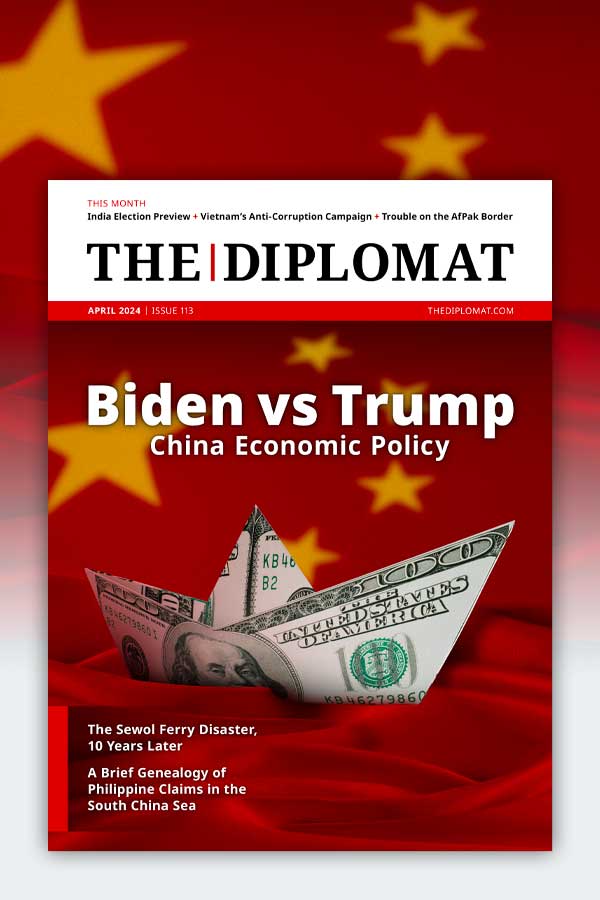| Welcome to the latest issue of Diplomat Brief. This week our top story explores how the 2014 Sewol Ferry disaster reshaped activism in South Korea. We also have an interview with Dr. Antonio Fiori of the University of Bologna on Europe’s approach to the Korean Peninsula. |
| Story of the week | ![[object Object]](https://thediplomat.com/diplomat-brief/2024/vol16/images/feature.jpg?v=1) | Society How the Sewol Sinking Changed South KoreaWhat Happened: On April 16, 2014, the MV Sewol capsized off the Korean Peninsula. Of the 476 people on board, 304 died in the sinking – including 250 high school students. It soon became apparent that this was a man-made disaster, from lax safety practices on the part of the ferry owners to incompetent disaster response from the Coast Guard and the government. After the disaster, the public backlash – spearheaded by the bereaved family members – created a wave of activism that continues today. Our Focus: As anthropologist Dr. Sera Yeong Seo Park explains in her analysis, “The Sewol disaster came to be seen as an illustrative ‘case in point’ of the various ills that had gone unchecked throughout South Korea’s rapid ascension to a global powerhouse.” The public anger over the botched response –and the cover-up attempt by the government – eventually led to the impeachment of then-President Park Geun-hye, a first in Korean history. Today, organizations formed by the grieving families continue to hold events and demonstrations, calling for “a thorough systemic change that would ensure that no such tragedy recurs.” As Park Sung-hyun from the 4.16 Foundation told The Diplomat: “There were lives lost, but no one held accountable… if responsible parties are let off the hook, we won’t see anyone committed to saving lives in other instances of disasters.” What Comes Next: The Itaewon Crowd Crush of October 2022 brought a sense of dejection to groups pushing for change after Sewol. Both tragedies had common themes, suggesting that not much had changed. However, the disaster also provided a new impetus for the movement, as Itaewon families joined hands with Sewol family groups. Today, the supportive response from the South Korean public amid the 10th anniversary of the Sewol’s sinking has renewed the hope of advocacy groups. One mother of a student lost in the disaster says she was touched to see that the push for better safety practices and greater accountability is not seen as the responsibility of the affected families alone, but as “homework to be brought to completion by our society.” Read this story |
| Behind the News | INTERVIEW Antonio FioriDr. Antonio Fiori, associate professor at the Department of Political and Social Sciences, University of Bologna, and co-editor of “The Routledge Handbook of Europe-Korea Relations,” on South Korea’s rapidly expanding ties with NATO: “South Korea used to lag behind other nations in strengthening its cooperation with NATO, but it has now caught up with NATO’s other Asia-Pacific partners and is even ahead in several areas.” Read the interview |
| This Week in Asia | Northeast Asia Germany’s Olaf Scholz in ChinaGerman Chancellor Olaf Scholz was in China from Sunday to Tuesday, his second visit to the country since assuming office in 2021. Russia’s invasion of Ukraine – and China’s tacit support for Moscow – was a major point of contention, as usual. However, this time around even business ties were not a safe topic of discussion. The EU has launched a wave of new investigations into alleged Chinese dumping of green tech products like EV and wind turbines in European markets. Overcapacity is the new watchword in China’s increasingly tense economic relations with both the U.S. and Europe. Find out more | South Asia Maldives’ Parliamentary ElectionsMaldivians will elect a new parliament on April 21. The campaign is more unpredictable than most, with the two major parties – the ruling People’s National Congress and the opposition Maldivian Democratic Party – riven by infighting. Coming just seven months after the PNC’s Mohamed Muizzu ousted the MDP’s Ibrahim Solih in the presidential vote, the legislative election will now determine whether Muizzu has the numbers to carry out his agenda – including his high-profile “India Out” campaign. Find out more | Southeast Asia Singapore Prepares for Long-Awaited Leadership TransitionPrime Minister Lee Hsien Loong announced on Monday that he will step down on May 15, to be replaced by Deputy Prime Minister Lawrence Wong. Lee, who has been in office since 2004, started looking to hand over the reins in 2016 – but the pandemic and repeated mishaps by his originally chosen successor forced several delays. The handover on May 15 will be a watershed moment for Singapore’s politics as the Lee family – Lee Hsien Loong is the son of Singapore’s long-ruling Prime Minister Lee Kuan Yew – finally transitions out of the political scene. Find out more | Central Asia Can Uzbekistan's Education System Keep Up?Uzbekistan, with Central Asia’s largest and rapidly expanding population, has a problem: Given present birth rates, by 2030 nearly 1 million new students will be starting primary school each year. And Uzbekistan simply does not have the school facilities or teachers to provide them with adequate education. As it is, public schools in some parts of the country already work in shifts to accommodate the massive number of students. Find out more |
| Visualizing APAC |  | Source: Chinese Ministry of Commerce China has bilateral or multilateral FTAs covering 29 countries, notably not including the U.S. or any EU member countries. See the full picture |
| Word of the Week | Economy もしトラMoshi Tora, Japanese for “maybe Trump,” a phrase coined to discuss the possibility of Donald Trump being re-elected U.S. president in November – with all that implies for Japan’s security. Find out more |
|  |
![[object Object]](https://thediplomat.com/diplomat-brief/2024/vol16/images/feature.jpg?v=1)

